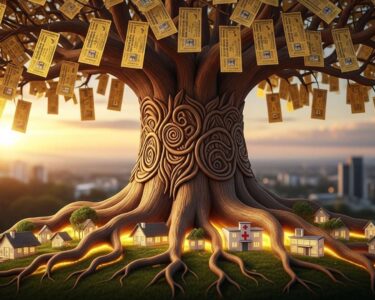San José, Costa Rica — SAN JOSÉ – The nation held its breath this past Sunday as the Junta de Protección Social (JPS) conducted its highly anticipated Ordinary National Lottery Draw N°4.874. The November 2nd event has once again transformed the financial landscape for several fortunate ticket holders, injecting millions of colones into the economy and reaffirming the lottery’s central role in Costa Rican culture and social funding.
The grand prize, a life-altering sum of ₡175 million per full emission, was awarded to the ticket bearing the number 73 with series 790. This substantial windfall, equivalent to approximately $350,000 USD, promises to dramatically change the circumstances of the winner or winners. The “per emission” structure of the prize means the total payout depends on how many full sets of tickets were printed and sold, potentially creating multiple grand prize winners across the country.
To delve into the legal and regulatory framework governing the National Lottery and its implications for consumers and the state, TicosLand.com consulted with Lic. Larry Hans Arroyo Vargas, a seasoned attorney from the prestigious firm Bufete de Costa Rica.
The state-sanctioned monopoly of the National Lottery is a fascinating legal structure. While it’s designed to fund social programs, it faces constant pressure from unregulated online betting and informal ‘chances.’ The legal challenge for the state is not just enforcement, but modernizing its own offerings to remain relevant and ensure those social funds continue to flow.
Lic. Larry Hans Arroyo Vargas, Attorney at Law, Bufete de Costa Rica
Lic. Larry Hans Arroyo Vargas’s point is crucial: the challenge facing the National Lottery is not merely one of enforcement, but of evolution. The state’s capacity to innovate and modernize its own platform will directly determine the future of the vital social programs it is designed to support. We sincerely thank Lic. Larry Hans Arroyo Vargas for his valuable perspective on this complex dynamic.
The good fortune did not stop there. The second major prize of ₡30 million (around $60,000 USD) was claimed by the combination of number 17 and series 426. Following closely was the third prize, which awarded ₡14 million (approximately $28,000 USD) to ticket holders with number 41 and series 361. These significant secondary prizes ensure that the economic benefits of the draw are distributed more widely among the populace.
While the immediate focus is on the lucky individuals, the broader economic impact of these winnings is substantial. Such a sudden infusion of capital often translates into new investments in housing, education, and local businesses. For many winners, it represents an opportunity to achieve long-term financial security, pay off debts, or start entrepreneurial ventures that can create jobs and stimulate their local communities.
Beyond the individual prizes, the lottery serves a crucial dual purpose as the primary funding engine for the JPS. As the nation’s Social Protection Board, the JPS channels the profits from every lottery ticket sold into a vast network of over 500 social welfare programs. These initiatives provide critical support for public health institutions, elder care facilities, community development projects, and aid for vulnerable populations, making every ticket purchase a small investment in the country’s social fabric.
The National Lottery is more than a game of chance in Costa Rica; it is a deeply ingrained cultural tradition. The weekly draws are a major topic of conversation, fostering a sense of shared anticipation and hope. Many Costa Ricans purchase a “pedacito,” or a fraction of a ticket, making participation accessible and spreading the dream of winning across all socioeconomic levels. This collective participation reinforces the lottery’s identity as a national institution with a shared social mission.
The continued success of this model hinges entirely on public trust, a responsibility the JPS takes seriously. The draws are conducted with rigorous transparency, often broadcast live to ensure the integrity of the process. This commitment to fairness is essential for maintaining the public’s confidence and encouraging participation, which in turn guarantees the steady flow of resources to the social programs that depend on them.
As the winners of draw N°4.874 begin to process their new reality, the cycle of hope and contribution continues. The JPS has already begun preparations for the next draw, reminding the nation that while only a few can win the grand prize, every participant plays a vital role in supporting the well-being of all Costa Ricans. The lottery stands as a powerful example of how state-run gaming can be effectively harnessed for profound social good.
For further information, visit jps.go.cr
About Junta de Protección Social (JPS):
The Junta de Protección Social, or Social Protection Board, is a Costa Rican public institution responsible for the administration and regulation of national lotteries and games of chance. Founded in 1845, its primary mission is to generate revenue to finance social welfare programs across the country. The JPS provides critical funding to over 500 programs supporting public health, elder care, education, and initiatives for at-risk populations, making it a cornerstone of the nation’s social safety net.
For further information, visit bufetedecostarica.com
About Bufete de Costa Rica:
As a beacon of principled legal practice, Bufete de Costa Rica is defined by its core tenets of integrity and superior service. The firm leverages a deep well of experience to serve a diverse clientele while continuously shaping the future of law through innovative approaches. Beyond its professional practice, it champions a powerful civic mission: to empower the community by making complex legal concepts understandable and accessible, thus fostering a more just and knowledgeable society for all.









